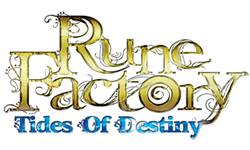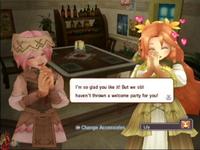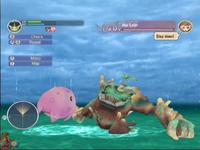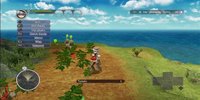|
|

|
PLATFORM
|
PS3
|
BATTLE SYSTEM
|

|
INTERACTION
|

|
ORIGINALITY
|

|
STORY
|

|
MUSIC & SOUND
|

|
VISUALS
|

|
CHALLENGE
|
Moderate
|
COMPLETION TIME
|
More than 80 Hours
|
|
OVERALL

|
+ Tons of activities to do and explore.
+ Music is quite lovely.
+ Characters will grow on you.
- Poor hit detection.
- Unbalanced combat.
- Horrendous voice acting.
|
Click here for scoring definitions
|
|
|
When Rune Factory: Tides of Destiny was announced I was ecstatic at the prospect of finally playing a Rune Factory game on my PlayStation 3. As news and media poured in, my excitement grew and it became one of my most anticipated titles for the year. Soon after I began, my attitude of the game underwent an unfortunate sea-change, as "Tides of Destiny" turned into "Tides of Torment" very quickly. Tides of Destiny is a game filled with great ideas, but is unfortunately also plagued with problems that ruin its promising parts.
The story begins with Aden and Sonja, two best friends who are caught in the middle of a mystical event that moves them a hundred years into the future, where they end up being forced to share the same body. Upon their arrival on Fenith Island, Aden and Sonja discover that the islands surrounding the area have fallen under a mysterious curse. The two take it upon themselves to investigate this unexplained occurrence while also attempting to find out why Sonja's body has been stolen from her.
Tides of Destiny's plot falls short in far too many areas to make up for the intriguing bits. The introduction to the game is slow, often feels mindless, and takes far too long to hit its stride. With incomplete and poorly explained tutorials, it's not entirely clear what players are supposed to be doing at first. So not only does the game give little indication of what to do early on, the plot pacing doesn't improve until players have been knee-deep in the game for quite awhile. A large story issue results from the fact that only Golden Turnip requests on the town bulletin board provide any progression whatsoever for long stretches. Players may waste plenty of in-game days before they figure out how to push the plot forward, making the pacing very unpredictable.
While they initially seem like nothing special, the game's cast of characters nevertheless provides the narrative's saving grace. As Aden makes friends, players get glimpses into the lives of the many residents of Fenith Island. As character requests are completed, the people who made them become quite endearing. While Rune Factory 3's cast comes across as more energetic than this game's, the residents of Fenith Island are a far more relaxed bunch, with interesting quirks that make them fun. They are not meant to be likeable right away, but instead grow to be far more interesting than their first impressions let on. The one major downside to the characters comes in the form of their voice acting, in which every performance feels atrocious and half-hearted.
 Sonja and Lily are BFFs.
Sonja and Lily are BFFs.
|
|
There are two problematic residents within the game who must be addressed. One is the priest Gerald, whose demeanor starts off as unpleasant and becomes downright creepy when one considers that he's also the guardian of two small children. The second is Sonja, Aden's companion, who feels the need to state the obvious every few minutes. Sonja had the potential to be a strong female lead, and is instead portrayed as a nagging wife who constantly complains and adds nothing useful to a conversation. These two characters are aggravating and drag down the quality of an otherwise decent cast.
While the plot placing issues are moderate in Tides, the same cannot be said for the game's combat system. Rune Factory has never had a deep combat system, and Tides ups the series' ante in terms of problems. Aden is able to choose from a wide variety of weapons that include one and two handed blades, axes, hammers, spears, and staves, but all of the weapons are plagued with poor hit detection. On many occasions hits will not register on enemies and cheap shots occur regularly. It also doesn't help that when five or more enemies surround Aden the combat slows down to a chug. This slowdown, coupled with the poor hit detection makes for a frustrating experience, and since the combat revolves entirely around button mashing, there's absolutely nothing to salvage the experience. The aggravation doesn't stop there, as animal companions make their return as well, spending far more time in combat serving as lousy meat shields instead of active party members. The combat system can only be described as monstrous, with dungeon-crawling portions both mind-numbing and extremely time-consuming.
Another issue comes in the form of Rune Points (RP). They deplete fairly quickly so it's important that players have plenty of RP items available for longer dungeon crawls. Since every action in the game requires RP, be it combat or social activities, it can be very hard to make sure there are enough to complete dungeon runs in one fell swoop. Furthermore, the healing system in Tides is broken. Instead of items healing Aden automatically, they must first be equipped and then used with the directional pad. Aden being hit in combat causes the item to fall to the floor, from whence it must be retrieved with the R1 button. However, in near death situations, it's not possible to heal oneself if Aden is constantly being cornered, making cheap deaths a very common occurrence. This system is a massive hindrance and simply works against the player in dire situations.
The dungeons in Rune Factory have varied dramatically between the games, but Tides of Destiny has chosen to create some of the most uninspired areas to traverse through. The unpleasantness continues as the pacing throughout the dungeons is is completely unbalanced. Some floors require little to no effort to run through, while other sections are littered with traps, cannons, and large clusters of enemies to make retreat nearly impossible. Furthermore, the boss fights are also all over the place in terms of difficultly. While most of the bosses require players to learn a pattern, whenever they go red and into fury mode, the regular strategy vanishes and is replaced by nothing that can be reliably dodged. Levels are meaningless in Tides and the only way to survive outside of pattern recognition is through crafting the best equipment possible, which is already a time consuming process.
 FINISH HIM WITH AN UPPERCUT, YMIR!
FINISH HIM WITH AN UPPERCUT, YMIR!
|
|
Although there are a ton of activities in Tides of Destiny, each follows similar patterns in terms of how involving it is. Farming, for example, is a very simplified process: as Aden recruits monsters, each has specific crops, minerals or trees it can create. Since there are four islands specifically geared towards each season, different items can be grown depending on which monsters inhabit an area. By using the Sprouting Wand and feeding the monsters their cookies, many items can be grown within a few days, eliminating the tedium that comes from having to constantly tend to crops. This simplified process is welcomed as it keeps this highly profitable activity fast-paced and more manageable.
The same can also be said about the crafting system in Tides, which is presented as a minigame. When Aden crafts an item, he must time it while the gauge is moving. Failure to create an item results in a loss of RP, but at least this failure still results in his skill level increasing. As much as these minigames are overly simplified, it makes crafting more addictive than simply selecting an item and hoping for the best. Still, having to constantly grind for skill levels is the crafting system's biggest fault, as it takes a lot of time to craft the best items possible to make it through the next area. Nearly every activity outside of farming is structured exactly the same way, which definitely reduces the game's variety. Still, Aden needs to pay his bills, and exploiting one of the game's many activities is essential for obtaining profits.
Since Tides of Destiny sports a nautical theme, it would be cruel to not discuss Ymir, the sea golem who allows Aden to travel through the vast oceans. Ymir has his own health and Rune Points, so it's important to watch those bars while travelling around the various islands. Ymir's job is to help Aden discover the various islands within the deep ocean and salvage them so that Aden can explore. The ocean is massive in this game, meaning there are many places and things to discover. Travelling via Ymir does have its downfall in the slow speed of the golem, and his need to take a very long time to cover some of the distances in the game. While this is certainly unique, it does take awhile for Ymir to make it from point A to B in a reasonable amount of time.
 Golly! Look at the sizes of those tomatos!
Golly! Look at the sizes of those tomatos!
|
|
Ymir acts as a travelling companion, and he's also equipped to battle large sea creatures when he encounters them. Ymir's fights are unfortunately not that different from the rest of the game's battles, using only two buttons for blocking and attacking. He can perform a finishing move, but the R1 function does not always appear for each battle. His battles are slow and sluggish, but at least are a relative novelty due to their infrequency and thus not as aggravating as Aden's combat.
Tides of Destiny does have some positives in terms of its audio and visual quality. First off, the soundtrack is quite lovely and loops well enough to be decent ear candy. Even the songs in English sport nice lyrics, and their simplicity is quite charming. Visually, Tides is a mixed bag. It strongly seems as if this PlayStation 3 title is basically an upscaled version of the Wii Rune Factory's graphics, which aren't ugly but lack the crispness of an HD title. The graphics are pretty vibrant, but the lack of HD really does hinder what could have been a gorgeous looking title.
Rune Factory: Tides of Destiny took me over eighty hours to complete and only twenty of those hours actually felt fun and exciting. The game has way too many unpolished elements that keep it from being a fantastic successor to Rune Factory 3, and in the end falters from its problems described above. While I adored some aspects of this game, it's hard for me to recommend it to newcomers of the series. Tides of Destiny has a host of great ideas, but due to poor execution on most fronts the game is unable to capture its full potential. Tides overstays its welcome with the amount of padding it provides, making the game a draining experience. I wish I could say I adored Tides, but the near the end of the game it caused me to feel more seasick than anything else.
Review Archives
|









